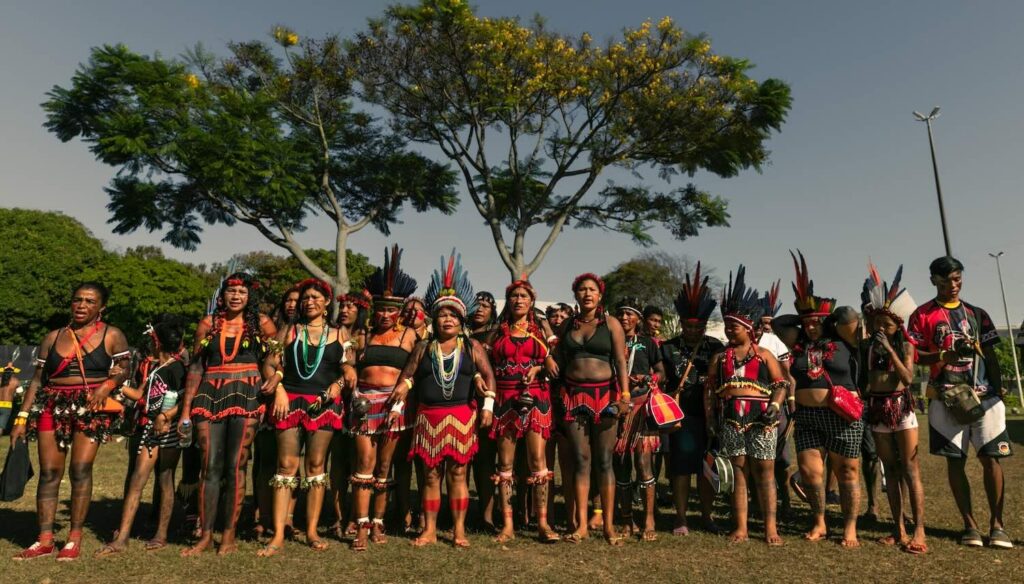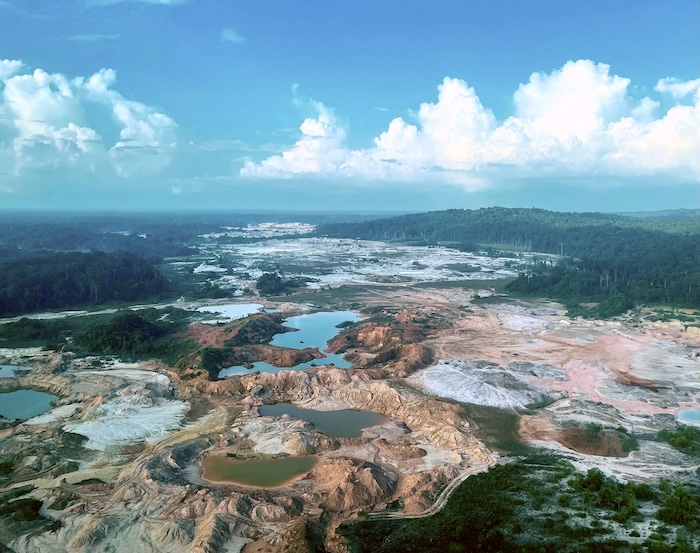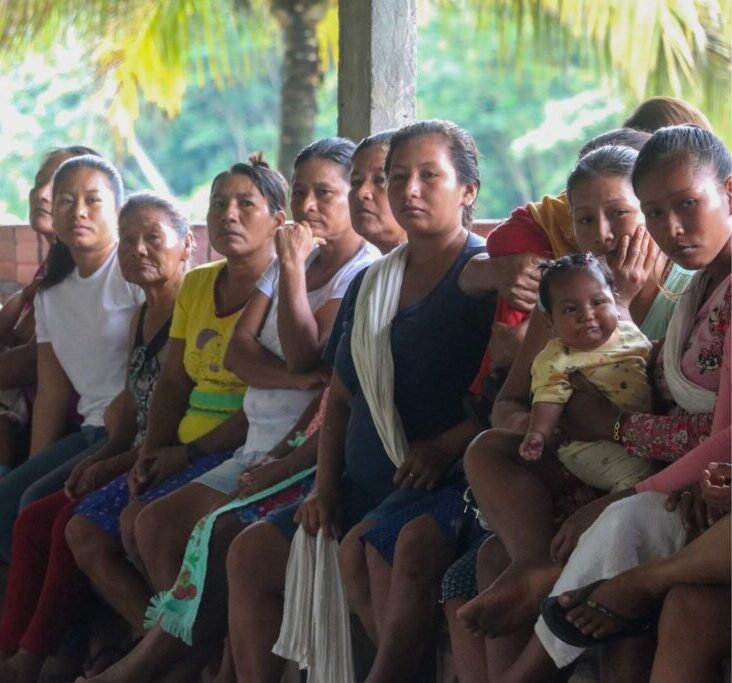- Securing land titles for Indigenous peoples is one of the most effective strategies to protect rainforests and our planet.
- The Rainforest Foundations collectively work with partners on the ground to protect more than 218 million acres of rainforest, sequestering 973 million tons of CO2 annually—equivalent to the combined emissions of the UK, France, and Italy.
- The Rainforest Foundations are scaling up efforts to channel significant funding directly to Indigenous communities and organizations, amplifying their forest protection efforts and greater resilience to climate disasters.
On Earth Day, we are asking a crucial question: What if we acted for our planet before it’s too late?
Rainforest Foundation US (RFUS), alongside Indigenous partners, has long advocated for a proven solution to mitigate the impacts of climate change—securing Indigenous peoples’ rights to their ancestral lands in Latin America’s rainforests.

Indigenous communities manage 25% of the world’s land and safeguard much of the planet’s remaining biodiversity1, including nearly half of the world’s endangered mammals—despite making up only 6% of the global population2. They are the frontline defenders of our planet’s rainforests. Their deep connection to and profound understanding of their lands, along with their decades-long fight to protect their forests, have resulted in up to 26% lower deforestation rates on their lands than the global average3. These forests are Earth’s greatest carbon sinks, and preserving them is one of our best chances to to protect our planet. Urgent action is needed to secure and protect them before it’s too late.
A Critical Moment for Rainforests
Deforestation is the second-largest source of global carbon emissions, and securing Indigenous peoples’ land rights is one of the most effective ways to prevent this. In the Amazon, Indigenous peoples hold around 29% of the land, of which nearly half is located in Brazil4. However, much of this land has not yet been officially recognized as Indigenous territory, leaving the majority of the rainforest vulnerable.

“When backed by a property title, a stronger system of territorial control can be established.”-Jorge Perez, Murui Indigenous leader and president of the Interethnic Association for the Development of the Peruvian Rainforest (AIDESEP)
Rampant deforestation is being driven by external pressures, including extractive industries, state-backed interests, and illegal criminal networks that exploit forests for profit. For communities without legal recognition of their ancestral lands, resisting these encroaching threats becomes even more challenging. Recent data shows that Brazil experiences the highest rates of deforestation globally, with Peru ranking fifth5.
Deforestation is not only an environmental disaster, it is a profound violation of social, cultural, and human rights, jeopardizing the food security, cultural heritage, and way of life of forest-dependent communities. Forests serve as natural pharmacies and are vital sources of food, medicine, and materials for Indigenous and local communities. Deforestation disrupts these vital supplies, driving poverty and food insecurity. It is directly linked to rising malnutrition among Indigenous populations, as much of their nutrition comes from forest products. More than that, it erodes the transfer of traditional knowledge to younger generations. Indigenous peoples hold unparalleled expertise in managing their ecosystems—wisdom that is disappearing as the forests vanish. The loss of this deep, place-based knowledge is an irreparable blow to all of humanity.
When we see enormous trees, we never cut them down because ancestrally, spiritually, we believe they’re part of our mother. But these big companies want to cut down everything. And it’s not right.
– Donalds Negría, from the Wounaan people in Panama
The Rainforest Foundations
The Rainforest Foundations—comprising Rainforest Foundation US (RFUS), Rainforest Foundation Norway (RFN), and Rainforest Foundation UK (RFUK)—work across the world’s most critical forest landscapes, including the Amazon, Mesoamerica, Congo Basin, and Southeast Asia & Oceania, supporting over 100 Indigenous and local community partners. In these regions, the Rainforest Foundations focus on protecting vulnerable territories under escalating threats by helping demarcate and title Indigenous peoples’ lands. This includes programs that address critical issues such as protecting Indigenous peoples living in voluntary isolation, supporting threatened environmental defenders, and advocating for stronger legal frameworks for Indigenous and local community rights. The Rainforest Foundations also assist communities impacted by food insecurity, and public health crises due to changes in the climate. And through territorial protection efforts, the Rainforest Foundations tackle threats by implementing community-based forest monitoring, land-use planning, and strategic advocacy with government agencies, ensuring that those who seek to destroy the forest are kept off Indigenous lands.

These collective efforts are crucial for preserving forests, supporting the communities that depend on them, and safeguarding our shared planet.
”It’s a mechanism for defense…with our new title, we will now be able to better protect our territory, and outsiders will no longer be able to cut down our forests for timber.” -Lenin Saúl Chávez Barbosa, an Indigenous municipal agent of the Puerto Sinaí community, Peru, whose community received a legal land title with support from RFUS
Decades of building strong relationships with Indigenous communities and organizations are generating impactful results. Together, the Rainforest Foundations have contributed to the legalization and protection of over 80 million acres of Indigenous peoples’ lands—equivalent to the size of Norway. This land stores about 18 billion tons of CO2, equivalent to 50% of the world’s annual anthropogenic emissions. And today, as of 2025 the Rainforest Foundations actively support the protection of over 218 million acres of rainforest, which sequesters approximately 973 million tons of CO2 annually—the combined emissions of the UK, France, and Italy.
Bridging the Gap & Scaling Solutions
Recent studies demonstrate that lands held by Indigenous communities experience 66% less deforestation than untitled lands. Further, studies show that active protection measures, like community-based forest monitoring, can reduce deforestation on Indigenous lands by 52% within a single year. Yet, one of the biggest obstacles to securing Indigenous land rights, preventing deforestation, and enabling communities to sustainably manage and protect their lands is the lack of international funding reaching Indigenous communities on the frontlines. A report by Rainforest Foundation Norway revealed that less than 1% of global climate mitigation and adaptation funding over the past decade has reached Indigenous peoples and local communities who protect the world’s rainforests. Recognizing the urgent need to bridge this gap, the Rainforest Foundations provide direct support to Indigenous communities and local organizations to ensure that funds flow where they are most needed.
Scaling our collective impact is crucial to preserving vital, carbon-storing rainforests. The Rainforest Foundations are uniquely positioned to channel funding directly to the communities most in need, helping them scale their forest protection efforts and strengthen their resilience to the changing climate.
– Josh Lichtenstein, Policy Director at RFUS
As we approach COP30 in Brazil in November 2025—the 30th United Nations Climate Change Conference of the Parties—Indigenous leadership has the power to reshape how we protect the world’s rainforests. COP30 marks a decade since global commitments were made in the Paris Agreement. At this critical moment, the Rainforest Foundations will push for increased financial and policy commitments that strengthen land rights for Indigenous peoples and local communities while amplifying Indigenous leadership. This includes advocating for a new funding pledge for Indigenous peoples and local communities (“Pledge 2.0”) and an intergovernmental commitment to recognize Indigenous peoples lands through the Forest and Climate Leaders’ Partnership (FCLP).
What if?
There has never been a more urgent time to scale support for Indigenous peoples’ rights to their rainforest lands. 2024 was the hottest year on record, with vast areas of the rainforest enduring some of the harshest droughts and most destructive fires in recent history. These fires and droughts reveal how the Amazon is increasingly vulnerable—not just to deforestation, but to the accelerating disasters that result from changes to the climate. Historically known as a vital carbon sink, the Amazon as a whole is becoming a carbon emitter, with the growing frequency of deforestation accelerating this dangerous shift. However, Indigenous peoples’ lands in the Amazon remain a strong carbon sink.
We have the opportunity to act for our planet before it’s too late. In 2024, through titling and monitoring Indigenous peoples’ lands, RFUS helped Indigenous communities sequester 9.8 million metric tons of CO2e—equivalent to the annual emissions of approximately 2 million cars. Imagine the impact we could make in just a year or two with even more support.
We can’t do it alone. This Earth Day, stand with the communities who have protected the world’s rainforests for generations—and help ensure they can continue to do so. Together, we can help protect our planet before it’s too late.
Sources:
- Earth.Org, The Silent Cry of the Forest: How Deforestation Impacts Indigenous Communities, August, 8, 2023. ↩︎
- Global Citizen, What’s the Best Way to Save Our Rainforests? Ask Indigenous Communities, March, 27, 2025. ↩︎
- Earth.Org, The Silent Cry of the Forest: How Deforestation Impacts Indigenous Communities, August, 8, 2023. ↩︎
- World Resource Institute, Indigenous Forests Are Some of the Amazon’s Last Carbon Sinks, January 6, 2023. ↩︎
- Cultural Survival, The Crisis of Deforestation on Indigenous Lands and Territories, March, 21, 2025. ↩︎



